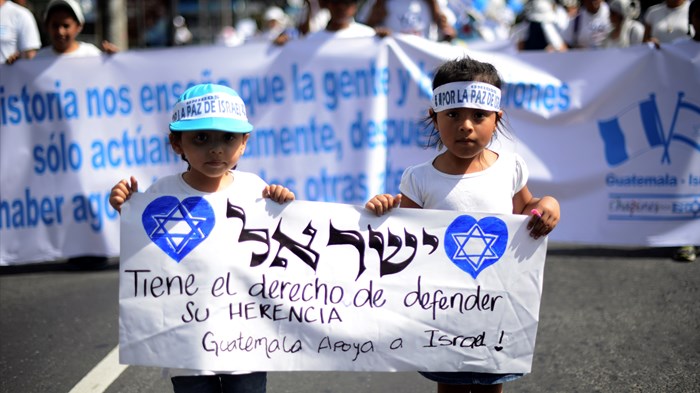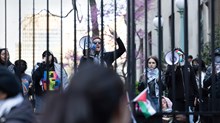
During the last weekend in October, hundreds of Honduran Christians gathered in their country’s major cities to pray for Israel.
Attendees performed Jewish folk dances and waved Honduran and Israeli flags. Some knelt in the middle of Parque Central in the capital city of Tegucigalpa, asking God for peace after Hamas’ October 7 attacks spurred war in the region.
These gatherings in Honduras were just one of many ways Latin American evangelicals have rallied in support of Israel. Earlier this month, more than 10,000 people marched in support of Israel in Guatemala City in an event featuring local televangelist Cash Luna, a Palestinian bishop, a Sierra Leonean imam, as well as Jewish and evangelical leaders.
While all Latin American countries have at one point diplomatically recognized Israel, nine nations—Cuba, Nicaragua, Bolivia, Honduras, El Salvador, Argentina, Uruguay, Paraguay, and Brazil—also recognize the State of Palestine. (In 1973, Cuba terminated its relationship with Israel, and in 2009, Venezuela and Bolivia broke ties with Israel over what the Venezuelan Ministry of Foreign Affairs called “the gravity of the atrocities against the Palestinian people.”)
Yet as the evangelical community in Latin America grew from 4 percent in 1970 to nearly 20 percent today, their countries’ affinity for Israel has manifested in religious and political ways. Still, on the whole, Latin American countries and their citizens hold a range of views on the current conflict.
In the wake of the October 7 attacks, evangelical leaders from countries including Mexico, Guatemala, El Salvador, Colombia, and Argentina “organized acts of prayer, demonstrations, and campaigns in favor of Israel, as well as sending letters and messages to Israeli ambassadors to express their support and friendship,” said Honduran Miguel Muñoz, spokesman for the Spanish-speaking world at the International Christian Embassy in Jerusalem (ICEJ).
“The war between Israel and Hamas has triggered a wave of solidarity and support from evangelicals in Latin America toward the Jewish State,” he said.
Many Latin American evangelicals anchor their love for Israel in Genesis 12:3, where God tells Abraham that God will bless those who bless the new country that comes from him and curse those who curse it. For many, the modern state of Israel fulfills God’s promises to Abraham and his descendants and also has a crucial role to play in the end times.
“Most of the evangelical church here understands that from Israel we have received salvation and that from Israel the Messiah has come to us,” said Kevin Torres, a pastor at the Evangelical Fellowship of Honduras in Tegucigalpa. He added that his church celebrates the Festival of Booths (Sukkot, also known as the Feast of Tabernacles) and dedicates that day to Israel.
The governments of Honduras, Guatemala, and El Salvador, where evangelicals now make up at least 40 percent of each population, have all stepped up for Israel in significant ways in recent years.
In 2021, Honduras followed the lead of the United States in transferring its embassy in Israel from Tel Aviv to Jerusalem, where then-president Juan Orlando Hernandez received a warm welcome by Israel’s then–prime minister Naftali Bennett. (International consensus has historically suggested that determining the status of Jerusalem, which both Palestinians and Israelis currently claim as their capital, should be negotiated between the two parties.)
Current Honduran president Xiomara Castro, in contrast, recently recalled the Honduran ambassador to Israel over the “serious humanitarian situation” civilian Palestinians were enduring.
Guatemala was the first Latin American country to move its embassy to Jerusalem in 2018.
“Guatemala is one of the most distinguished countries on the planet in its faithful support of Israel since its memorable vote at the United Nations in 1947” which led to the creation of Israel, said Luis Fernando Solares, a pastor who has served for years as ICEJ’s ambassador in Guatemala. “Guatemalan cities and towns have a large number of streets, avenues, and parks that bear the name ‘Jerusalem, Eternal Capital of Israel.’”
In September, the nation elected as president Bernardo Arévalo, the son of a former president who had previously served as the Guatemalan ambassador in Israel. Arévalo, who lived in Israel for ten years and speaks Hebrew, has spoken fondly of the Jewish state while also criticizing his predecessor’s decision to move the embassy, declaring that the move “violated international law.”
In neighboring El Salvador, President Nayib Bukele expressed his support for Israel following the Hamas attacks. Though he is of Palestinian descent, Bukele referred to Hamas as “savage beasts,” condemned their terrorist activities, and criticized the international community for not doing enough to support Israel in its fight against terrorism.
Many Latin American evangelicals admire Israel’s achievements in science, technology, agriculture, and defense, and see it as a model of resilience and innovation. They also identify with Israel’s struggle against terrorism and radical Islam, and share its values of freedom, democracy, and human rights.
This enthusiasm, along with Christian Zionist convictions, has led many evangelical leaders and organizations in Latin America and the US to advocate for Israel. For example, the National Hispanic Christian Leadership Conference (NHCLC) / Conela, which claims to represent more than 100 million Hispanic evangelicals in the US and Latin America, has stated that its commitment to the Jewish people and Israel is “without compromise.”
In recent decades, NHCLC/Conela has launched several initiatives to strengthen ties between evangelicals and Israel, such as organizing trips to the Holy Land, hosting pro-Israel events and conferences, educating pastors and churches about Israel’s history and significance, and lobbying governments to adopt pro-Israel policies.
Though most Latin American evangelicals support Israel, Latin Americans as a whole hold a wide array of perspectives. Some support the narrative that portrays Israel as a victim rather than as an aggressor. Others are influenced by the legacy of the Cold War, which has primed them to be sympathetic to the Palestinian cause and suspicious of the US’s agenda due to Washington’s support of numerous military dictatorships in the region.
For others, it’s a question of demographics. About 700,000 Latin Americans of Palestinian origin live across 14 countries in the region. The vast majority of them live in Chile, where many Christians fled from the Ottoman Empire in the late 19th century. Today they number more than half a million people. At a Palestinian Christian celebration of Christmas last year, Chilean president Gabriel Boric announced that the country would open an embassy in the West Bank.
Along with Honduras, the governments of Chile, Colombia, and Bolivia withdrew their ambassadors from Israel over the country’s actions against Gazan civilians.
As the war continues, evangelicals must show “Christian love without distinction of race or religion,” Muñoz said. “We see ourselves as contributors to peace and justice in the Middle East and the world by supporting Israel, the only pluralistic democracy [that respects] human rights … in the Middle East, and at the same time admitting that our adversity is not against the Palestinian people but against extremists who do not respect the human right to freedom of expression and religion.”

Support Our Work
Subscribe to CT for less than $4.25/month


















